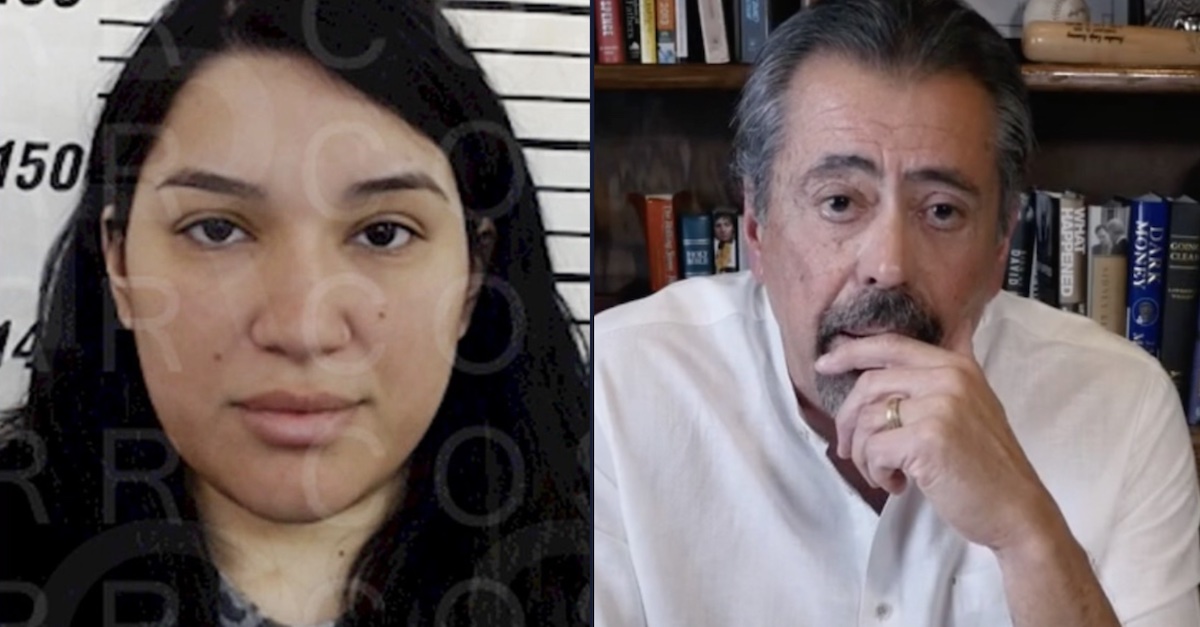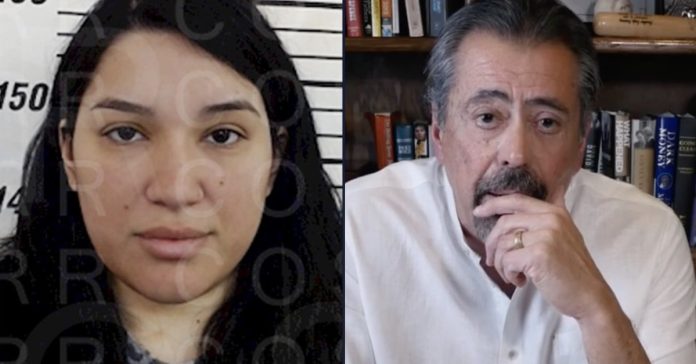
Lizelle Herrera, identified as Lizelle Gonzalez in her lawsuit, as she appeared in a booking photo after her arrest; Starr County District Attorney Gocha Ramirez in a YouTube video (Gocha for District Attorney/screengrab)
A woman who was falsely indicted for murder in Texas following a self-induced abortion is now suing the district attorney who faced discipline months ago for allowing the legally bogus case to be brought under his watch, only to dismiss it days later.
Lizelle Gonzalez, who went by the name Lizelle Herrera at the time of her arrest, filed a $1 million civil rights lawsuit in the U.S. District Court for the Southern District of Texas, McAllen Division, on Thursday against Starr County DA Gocha Allen Ramirez, claiming that he, defendant Assistant DA Alexandria Barrera, and defendant Starr County should be held to account for the lasting damage their “illegal and unconstitutional actions” caused.
“As a result of the Defendants’ unconstitutional actions, Plaintiff was subjected to the humiliation of a highly publicized indictment and arrest, which has permanently affected her standing in the community. But for Defendants’ conduct, Plaintiff would not have suffered these harms,” said the complaint filed by attorney Ida Cecilia Garza, alleging a deprivation of rights under the Constitution. “[Gonzalez] brings this case not only to vindicate her rights but also to hold accountable the government officials who violated them.”
Gonzalez pointed out nationwide media attention on her case, complete with a mug shot after her arrest, only got more attention after the charges were dropped since the “prosecution was frivolous.”
Ramirez, an elected Democrat, was found to have engaged in “misconduct” by violating the Texas Disciplinary Rules of Professional Conduct under 8.01(a) — “knowingly make a false statement of material fact” — 3.09(a) — “The prosecutor in a criminal case shall: (a) refrain from prosecuting or threatening to prosecute a charge that the prosecutor knows is not supported by probable cause” — and rules 5.01(a) and 5.01(b). The latter two state:
A lawyer shall be subject to discipline because of another lawyer’s violation of these rules of professional conduct if:
(a) The lawyer is a partner or supervising lawyer and orders, encourages, or knowingly permits the conduct involved; or
(b) The lawyer is a partner in the law firm in which the other lawyer practices, is the general counsel of a government agency’s legal department in which the other lawyer is employed, or has direct supervisor authority over the other lawyer, and with knowledge of the other lawyer’s violation of these rules knowingly fails to take reasonable remedial action to avoid or mitigate the consequences of the other lawyer’s violation.
Consequently, Ramirez was handed a probated suspension for one year for allowing Barrera, who is “under his direct supervision,” to “pursue criminal homicide charges against an individual for acts clearly not criminal” under Texas law.
“[Ramirez] failed to refrain from prosecuting a charge that was known not to be supported by probable cause,” the judgment against him said.
The lawsuit said that Ramirez and Barrera “were aware” that the relevant law “exempted the death of an unborn child from the statute pertaining to murder ‘if the conduct charged is: (1) conduct committed by the mother of the unborn child,”” but they used “false and misleading information and omissions” to get the grand jury indictment anyway.
Texas Administrative Code explains that a probated suspension is a “heightened level of disciplinary action issued for a period of years,” but Ramirez “may continue to practice.”
The lawsuit focused on the disciplinary findings against Ramirez in support of the argument that the DA and Barrera should not be able to assert prosecutorial immunity from civil liability and should not be shielded by qualified immunity.
“As such, Defendants Ramirez and Barrera are not entitled to qualified immunity because they either submitted or directed the presentation of grand jury ‘evidence’ blatantly lacking in legal basis as to render their belief in its existence unreasonable,” the complaint continued. “No reasonable grand juror could have reasonably believed the law was otherwise due to Defendants’ unlawful actions.”
The plaintiff said the prosecutors deprived her of her freedom, harmed her reputation, humiliated her, and caused her distress both mental and emotional. Gonzalez sought damages in excess of $1 million and a jury trial.
Law&Crime reached out to the DA for comment.
Read the lawsuit here.
Marisa Sarnoff contributed to this report.
Have a tip we should know? [email protected]

